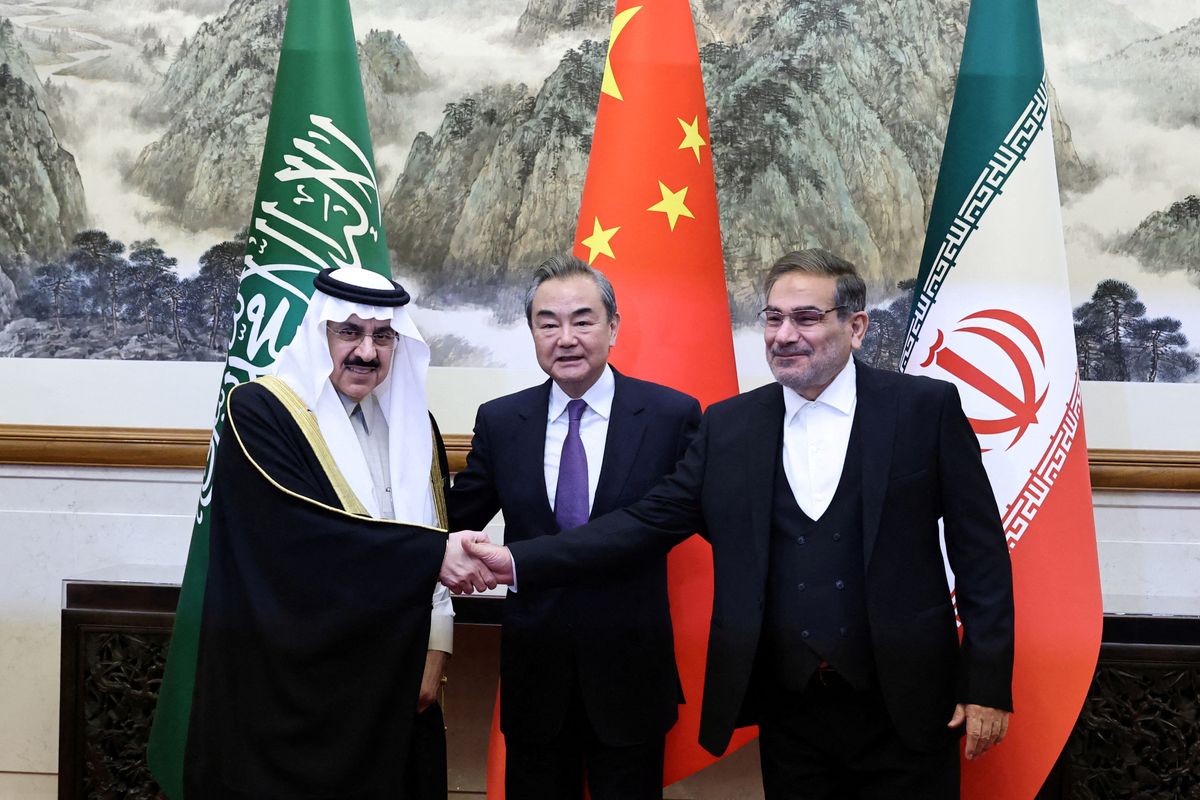China brokers historic Iran and Saudi Arabia diplomacy deal
There have been years of bad relations between Saudi Arabia and Iran.

A few minutes every morning is all you need.
Stay up to date on the world's Headlines and Human Stories. It's fun, it's factual, it's fluff-free.
The backstory: There have been years of bad relations between Saudi Arabia and Iran. Relations soured after the Saudi embassy in Tehran was raided by Iranian protesters demonstrating against the mass execution of 47 people in Saudi Arabia in 2016. One of the people executed was Saudi Shia cleric Nimr al-Nimr, who'd led protests for more rights for the Shia minority in Sunni Muslim-led Saudi Arabia. Since then, tensions have gotten worse until a massive missile and drone attack on Saudi Arabia's oil infrastructure in 2019 led to a critical cut in global oil production. Saudi Arabia accused Iran of being behind the attack, which Iran denied.
More recently: The two countries have been fighting a proxy war in Yemen and also supported opposite sides in other Middle-Eastern conflicts and disputes. Since 2021, they've been having talks in Iraq and Oman. China has been looking to mediate peace between Iran and Saudi Arabia, especially since it has ties with both countries and buys oil from each of them. Iran's president also recently visited China.
The development: Last Friday, Saudi Arabia and Iran re-established diplomatic ties for the first time in seven years through a deal brokered by China. Over the next two months, their embassies will re-open, and diplomatic missions will restart, meaning their foreign ministers can begin meeting again. Hopefully, the conflict in Yemen will ease as well. We could see the war in Syria begin to calm, too, and other shifts in security in Iraq and Lebanon. This peace deal has far-reaching consequences in the region and was received positively by the West.
Key comments:
"The Kingdom's leadership welcomes the initiative of His Excellency President Xi Jinping, based on the Kingdom's consistent and continuous approach since its establishment in adhering to the principles of good neighborliness, taking everything that would enhance security and stability in the region and the world, and adopting the principle of dialogue and diplomacy to resolve differences," said a statement from Saudi Arabia's national security advisor, Musaad bin Mohammed Al-Aiban.
"This is a victory for dialogue, a victory for peace, offering major good news at a time of much turbulence in the world," said China's top diplomat Wang Yi.
"Generally speaking, we welcome any efforts to help end the war in Yemen and de-escalate tensions in the Middle East region. De-escalation and diplomacy together with deterrence are key pillars of the policy President Biden outlined during his visit to the region last year," said White House spokesman John Kirby. "The Saudis did keep us informed about these talks that they were having, just as we keep them informed on our engagements, but we weren't directly involved."
"If you create a diplomatic vacuum, someone's going to fill it. That's basically what's happened to US policy in the Gulf," said Chas Freeman, a retired career diplomat familiar with the Middle East and China relations. "It's a really major development."
"The region needs the return of normal relations between its countries, through which the Islamic society can regain security lost from foreign interventions," said Houthi spokesman and chief negotiator Mohamed Abdulsalam, as the Houthi rebels welcomed the agreement.
"It indicates that the kingdom wants to focus on domestic economic development over geopolitical conflicts at present, particularly as conflicts in Syria and Yemen settle into stalemate and Iran's leaders are preoccupied by domestic unrest," said Andrew Leber, a political scientist focused on Saudi Arabia at Tulane University.




Comments ()